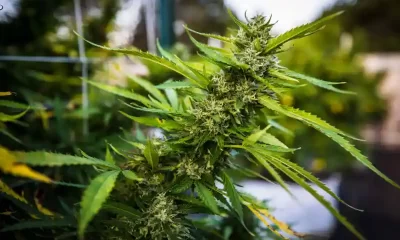Business
DEA Celebrates 50th Anniversary of War on Drugs, Drugs Are Winning

Drug use is higher than ever as the DEA celebrates its 50th anniversary.
Citing former president Richard Nixon, the Drug Enforcement Administration (DEA) celebrated the 50th anniversary of the agency’s creation and the War on Drugs, wrapping up 50 years of failed attempts to curb drug abuse, according to a July 5 announcement. The DEA’s tactics are not working: Decades of research indicates that drug use is up in just about every category.
Nixon created the DEA to combat the “menace” of drug abuse on July 1, 1973. That’s just four years after Gallup first asked Americans if they’ve tried smoking pot, and only 4% said they had tried it in 1969. Now that number is up to almost half, and 45% of American teens said they had tried pot, 47% of high school students by another count. Cannabis and hallucinogen use is at an all-time high, a National Institutes of Health-supported study reported in 2022.
“The Drug Enforcement Administration celebrated its 50th anniversary on July 1, 2023,” the announcement reads. “Over the past 50 years, DEA has worked to keep American communities safe and healthy by preventing criminal drug networks and drug-related violence and deaths.
In 1973, former President Richard Nixon proposed the creation of a new agency when he declared ‘an all-out global war on the drug menace.’ Congress heard months of testimony for the proposal and created the Drug Enforcement Administration later that year. The Drug Enforcement Administration integrated narcotics agents and U.S. Customs agents into one effective force. These agents work to remove dangerous drugs from the street and prevent them from coming across our borders.”
Are law enforcement officers at least focusing on hard drugs? The short answer is no. Police officers in the United States still make more arrests for cannabis offenses than for any other drug, according to FBI data. Pew research notes that in the 50 states and the District of Columbia in 2018, amounting to 40% of the 1.65 million total drug arrests in the U.S. that year were for pot.
The War on Drugs presents some ethical questions, however its roots in prejudice are reason alone to dismiss the war’s successes.
Questionable Beginnings
By today’s standards, Nixon’s comments as president are shocking, and the War on Drugs itself has been called racist. Nixon’s domestic policy chief, John Ehrlichman, admitted first in 1994 that the War on Drugs was specifically designed to target the Black community, and that lies were created about drugs.
“The Nixon campaign in 1968, and the Nixon White House after that, had two enemies: the antiwar left and Black people,” Ehrlichman said. “You understand what I’m saying? We knew we couldn’t make it illegal to be either against the war or Black, but by getting the public to associate the hippies with marijuana and Blacks with heroin, and then criminalizing both heavily, we could disrupt those communities. We could arrest their leaders, raid their homes, break up their meetings, and vilify them night after night on the evening news. Did we know we were lying about the drugs? Of course we did.” Ehrlichman spoke up about the matter again later on, such as in 2016.
Unfortunately, this bias is clearly evident today, as observed in the way cannabis laws are enforced. Data collected by the American Civil Liberties Union (ACLU) shows that due specifically to racial profiling and bias in cannabis enforcement, Black people are 3.6 times more likely than white people to be arrested for cannabis possession, despite similar usage rates. That rate goes up to 10 times more likely than whites to be arrested for pot in certain areas such as Montana or Kentucky.
The War on Drugs Didn’t Work
In the bigger picture, DEA enforcement isn’t deterring drug use effectively, according to multiple reports by Gallup.
“The war on drugs has been raging for decades,” Jennifer Robison wrote for Gallup in 2002. “There is no sign of victory, or even detente. Although they’re swamped with anti-drug messages, kids keep taking illegal drugs, and the drugs are getting more dangerous. The Centers for Disease Control and Prevention’s 1999 Youth Risk Behavior Surveillance System found that almost half (47%) of all high school students had used marijuana at least once. Ten percent had tried a form of cocaine.”
“Increased non-medical use—as well as racial, ethnic and class prejudice—affected public opinion,” they said. “What had been a medical condition became deviant or criminal. This shift led to a wave of laws against heroin, marijuana and cocaine.”
Source: https://hightimes.com/news/dea-celebrates-50th-anniversary-of-war-on-drugs-drugs-are-winning/
Business
New Mexico cannabis operator fined, loses license for alleged BioTrack fraud

New Mexico regulators fined a cannabis operator nearly $300,000 and revoked its license after the company allegedly created fake reports in the state’s traceability software.
The New Mexico Cannabis Control Division (CCD) accused marijuana manufacturer and retailer Golden Roots of 11 violations, according to Albuquerque Business First.
Golden Roots operates the The Cannabis Revolution Dispensary.
The majority of the violations are related to the Albuquerque company’s improper use of BioTrack, which has been New Mexico’s track-and-trace vendor since 2015.
The CCD alleges Golden Roots reported marijuana production only two months after it had received its vertically integrated license, according to Albuquerque Business First.
Because cannabis takes longer than two months to be cultivated, the CCD was suspicious of the report.
After inspecting the company’s premises, the CCD alleged Golden Roots reported cultivation, transportation and sales in BioTrack but wasn’t able to provide officers who inspected the site evidence that the operator was cultivating cannabis.
In April, the CCD revoked Golden Roots’ license and issued a $10,000 fine, according to the news outlet.
The company requested a hearing, which the regulator scheduled for Sept. 1.
At the hearing, the CCD testified that the company’s dried-cannabis weights in BioTrack were suspicious because they didn’t seem to accurately reflect how much weight marijuana loses as it dries.
Company employees also poorly accounted for why they were making adjustments in the system of up to 24 pounds of cannabis, making comments such as “bad” or “mistake” in the software, Albuquerque Business First reported.
Golden Roots was fined $298,972.05 – the amount regulators allege the company made selling products that weren’t properly accounted for in BioTrack.
The CCD has been cracking down on cannabis operators accused of selling products procured from out-of-state or not grown legally:
- Regulators alleged in August that Albuquerque dispensary Sawmill Sweet Leaf sold out-of-state products and didn’t have a license for extraction.
- Paradise Exotics Distro lost its license in July after regulators alleged the company sold products made in California.
Golden Roots was the first alleged rulebreaker in New Mexico to be asked to pay a large fine.
Source: https://mjbizdaily.com/new-mexico-cannabis-operator-fined-loses-license-for-alleged-biotrack-fraud/
Business
Marijuana companies suing US attorney general in federal prohibition challenge

Four marijuana companies, including a multistate operator, have filed a lawsuit against U.S. Attorney General Merrick Garland in which they allege the federal MJ prohibition under the Controlled Substances Act is no longer constitutional.
According to the complaint, filed Thursday in U.S. District Court in Massachusetts, retailer Canna Provisions, Treevit delivery service CEO Gyasi Sellers, cultivator Wiseacre Farm and MSO Verano Holdings Corp. are all harmed by “the federal government’s unconstitutional ban on cultivating, manufacturing, distributing, or possessing intrastate marijuana.”
Verano is headquartered in Chicago but has operations in Massachusetts; the other three operators are based in Massachusetts.
The lawsuit seeks a ruling that the “Controlled Substances Act is unconstitutional as applied to the intrastate cultivation, manufacture, possession, and distribution of marijuana pursuant to state law.”
The companies want the case to go before the U.S. Supreme Court.
They hired prominent law firm Boies Schiller Flexner to represent them.
The New York-based firm’s principal is David Boies, whose former clients include Microsoft, former presidential candidate Al Gore and Elizabeth Holmes’ disgraced startup Theranos.
Similar challenges to the federal Controlled Substances Act (CSA) have failed.
One such challenge led to a landmark Supreme Court decision in 2005.
In Gonzalez vs. Raich, the highest court in the United States ruled in a 6-3 decision that the commerce clause of the U.S. Constitution gave Congress the power to outlaw marijuana federally, even though state laws allow the cultivation and sale of cannabis.
In the 18 years since that ruling, 23 states and the District of Columbia have legalized adult-use marijuana and the federal government has allowed a multibillion-dollar cannabis industry to thrive.
Since both Congress and the U.S. Department of Justice, currently headed by Garland, have declined to intervene in state-licensed marijuana markets, the key facts that led to the Supreme Court’s 2005 ruling “no longer apply,” Boies said in a statement Thursday.
“The Supreme Court has since made clear that the federal government lacks the authority to regulate purely intrastate commerce,” Boies said.
“Moreover, the facts on which those precedents are based are no longer true.”
Verano President Darren Weiss said in a statement the company is “prepared to bring this case all the way to the Supreme Court in order to align federal law with how Congress has acted for years.”
While the Biden administration’s push to reschedule marijuana would help solve marijuana operators’ federal tax woes, neither rescheduling nor modest Congressional reforms such as the SAFER Banking Act “solve the fundamental issue,” Weiss added.
“The application of the CSA to lawful state-run cannabis business is an unconstitutional overreach on state sovereignty that has led to decades of harm, failed businesses, lost jobs, and unsafe working conditions.”
Business
Alabama to make another attempt Dec. 1 to award medical cannabis licenses

Alabama regulators are targeting Dec. 1 to award the first batch of medical cannabis business licenses after the agency’s first two attempts were scrapped because of scoring errors and litigation.
The first licenses will be awarded to individual cultivators, delivery providers, processors, dispensaries and state testing labs, according to the Alabama Medical Cannabis Commission (AMCC).
Then, on Dec. 12, the AMCC will award licenses for vertically integrated operations, a designation set primarily for multistate operators.
Licenses are expected to be handed out 28 days after they have been awarded, so MMJ production could begin in early January, according to the Alabama Daily News.
That means MMJ products could be available for patients around early March, an AMCC spokesperson told the media outlet.
Regulators initially awarded 21 business licenses in June, only to void them after applicants alleged inconsistencies with how the applications were scored.
Then, in August, the state awarded 24 different licenses – 19 went to June recipients – only to reverse themselves again and scratch those licenses after spurned applicants filed lawsuits.
A state judge dismissed a lawsuit filed by Chicago-based MSO Verano Holdings Corp., but another lawsuit is pending.
Source: https://mjbizdaily.com/alabama-plans-to-award-medical-cannabis-licenses-dec-1/
-

 Business2 years ago
Business2 years agoPot Odor Does Not Justify Probable Cause for Vehicle Searches, Minnesota Court Affirms
-

 Business2 years ago
Business2 years agoNew Mexico cannabis operator fined, loses license for alleged BioTrack fraud
-

 Business2 years ago
Business2 years agoAlabama to make another attempt Dec. 1 to award medical cannabis licenses
-

 Business2 years ago
Business2 years agoWashington State Pays Out $9.4 Million in Refunds Relating to Drug Convictions
-

 Business2 years ago
Business2 years agoMarijuana companies suing US attorney general in federal prohibition challenge
-

 Business2 years ago
Business2 years agoLegal Marijuana Handed A Nothing Burger From NY State
-

 Business2 years ago
Business2 years agoCan Cannabis Help Seasonal Depression
-

 Blogs2 years ago
Blogs2 years agoCannabis Art Is Flourishing On Etsy













